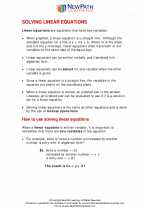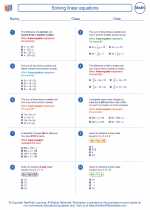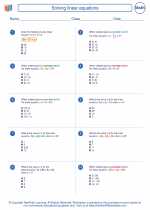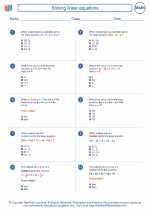Divisibility
Divisibility is a fundamental concept in mathematics that refers to the ability of one number to be divided by another number without leaving a remainder. Understanding divisibility rules can be very helpful in simplifying calculations and problem-solving in math.
Divisibility Rules
Here are some important divisibility rules for common divisors:
- Divisibility by 2: A number is divisible by 2 if its last digit is 0, 2, 4, 6, or 8.
- Divisibility by 3: A number is divisible by 3 if the sum of its digits is divisible by 3.
- Divisibility by 4: A number is divisible by 4 if the number formed by its last two digits is divisible by 4.
- Divisibility by 5: A number is divisible by 5 if its last digit is 0 or 5.
- Divisibility by 6: A number is divisible by 6 if it is divisible by both 2 and 3.
- Divisibility by 9: A number is divisible by 9 if the sum of its digits is divisible by 9.
Study Guide
To master the concept of divisibility, it is important to practice applying these rules to various numbers. Here are some steps you can follow to study divisibility effectively:
- Memorize the divisibility rules for common divisors such as 2, 3, 4, 5, 6, and 9.
- Practice identifying whether a number is divisible by another number using the applicable divisibility rules.
- Work on solving problems that involve divisibility, such as finding the least common multiple or determining factors of a number.
- Challenge yourself with more complex problems that require applying multiple divisibility rules in combination.
- Review and reinforce your understanding by solving divisibility-related exercises and problems regularly.
By mastering the concept of divisibility and its rules, you will build a strong foundation in number theory and arithmetic, which will be invaluable in various math topics and real-world applications.
.◂Math Worksheets and Study Guides Eighth Grade. Solving linear equations
Study Guide Solving linear equations
Solving linear equations  Worksheet/Answer key
Worksheet/Answer key Solving linear equations
Solving linear equations  Worksheet/Answer key
Worksheet/Answer key Solving linear equations
Solving linear equations  Worksheet/Answer key
Worksheet/Answer key Solving linear equations
Solving linear equations  Worksheet/Answer key
Worksheet/Answer key Solving linear equations
Solving linear equations  Worksheet/Answer key
Worksheet/Answer key Solving linear equations
Solving linear equations 

 Worksheet/Answer key
Worksheet/Answer key
 Worksheet/Answer key
Worksheet/Answer key
 Worksheet/Answer key
Worksheet/Answer key
 Worksheet/Answer key
Worksheet/Answer key
 Worksheet/Answer key
Worksheet/Answer key

The resources above cover the following skills:
Algebra (NCTM)
Represent and analyze mathematical situations and structures using algebraic symbols.
Use symbolic algebra to represent situations and to solve problems, especially those that involve linear relationships.